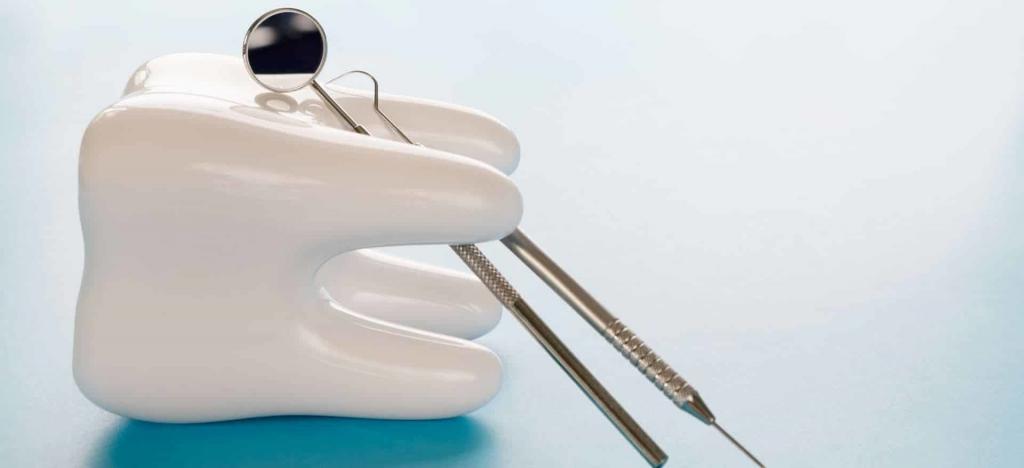On an autumn evening, there is nothing better than a comfortable sofa, a good film and a mug of warm tea or cocoa. But what to do if the pleasant moment is interrupted by pain? How to treat tooth sensitivity and where does it come from??
Tooth sensitivity - causes
Damage to the enamel is most often responsible for tooth sensitivity. Its defects result in the exposure of strongly innervated dentin. As a consequence, pain occurs not only when drinking cold or warm drinks, brushing the teeth, but also when there are changes in the weather or even when breathing in cold air.

And what destroys our enamel?
- Malocclusion - these often overload the teeth and thus damage the enamel. Therefore, if you are struggling with the problem of crooked teeth or malocclusion, be sure to consult your dentist. If you have neither the time nor the inclination to travel to Poland for every visit make an appointment at our practice, together we will find the best solution for you.
- Citrus and fizzy drinks - including lemons, oranges and grapefruit, but also sweet fizzy drinks have a very bad effect on the teeth. Too much consumption of these leads to demineralisation of the enamel, so rinse your mouth with water immediately after eating them. IMPORTANT: In this situation, it is better to brush your teeth only after half an hour or so, otherwise you rub the acid in, abrade the enamel and expose yourself to tooth sensitivity.
- Some whitening toothpastes - this applies to those products that have a high RDA (tooth enamel abrasion rating). These toothpastes have no harmful effects if used interchangeably with other toothpastes that do not whiten teeth.
- A hard toothbrush - pressing too hard, especially with a hard-bristled toothbrush, can damage the enamel but also expose the cervixes. The tooth brushing technique itself is also important, for more on this topic see here.
- Home remedies for whitening teeth - as we wrote earlier in our article, not all of them are good. Some of them damage the enamel and the effect is short-lived.
- Diseases of the digestive system - digestive juices and bile are very damaging to the enamel.
- Inadequate oral hygiene leads to plaque build-up and consequent damage to the enamel.

But that's not all
Tooth sensitivity can also result from cavities or damage to the teeth. Chipped or cracked teeth can cause pain when eating or drinking cold and hot foods and drinks. Decay and lack of regular visits to the dentist to remove tartar, among other things, also have a big impact.
People who grind their teeth or clench their teeth too hard and often may also have a problem with tooth sensitivity. So can those who bite their nails or pencil. All this can lead to mechanical damage to the enamel.
Sometimes, tooth sensitivity is also an innate trait that results from the structure of the enamel itself.
Important, tooth sensitivity is not just about discomfort. It can be a sign of periodontal disease, including gingivitis. It is therefore best to consult your dentist.

How to treat tooth sensitivity?
If you are already struggling with the problem of hypersensitive teeth, buy a toothpaste designed for people like you. It is important that the toothpaste has a low abrasiveness factor of max. 30 RDA and a high fluoride concentration. Also change your toothbrush to one with softer bristles and brush gently. Don't forget to floss and rinse with a mouthwash dedicated to sensitive teeth.
Also minimise the above-mentioned causes that contribute to tooth sensitivity.

And what if that doesn't help?
If home remedies for tooth sensitivity do not help, it is essential to make an appointment with your dentist. It is a good idea to have tartar removed every six months and to undergo fluoridation (varnishing). What is fluoridation? It is nothing more than the covering of teeth with a preparation with a high concentration of fluoride, which strengthens and seals the enamel and has an anti-carious effect.
At the dentist's office, you can also ask about preparations that alleviate tooth sensitivity, i.e. specialised toothpastes or rinses, among others. Their main function is to reduce the reaction to external stimuli, but also to close open dentinal tubules.
Another way of treating tooth sensitivity is to fill enamel defects with a special composite material. This creates a specific insulating layer for the sensitive nerve endings. However, this method is used for larger enamel defects. For smaller ones, the dentist can use a preparation containing high amounts of calcium and phosphates, which help neutralise acids and enrich the enamel.
Remember that regular visits to the dentist and proper dental hygiene can keep you away from tooth sensitivity. And if you are already struggling with this problem make an appointment in our practice.

